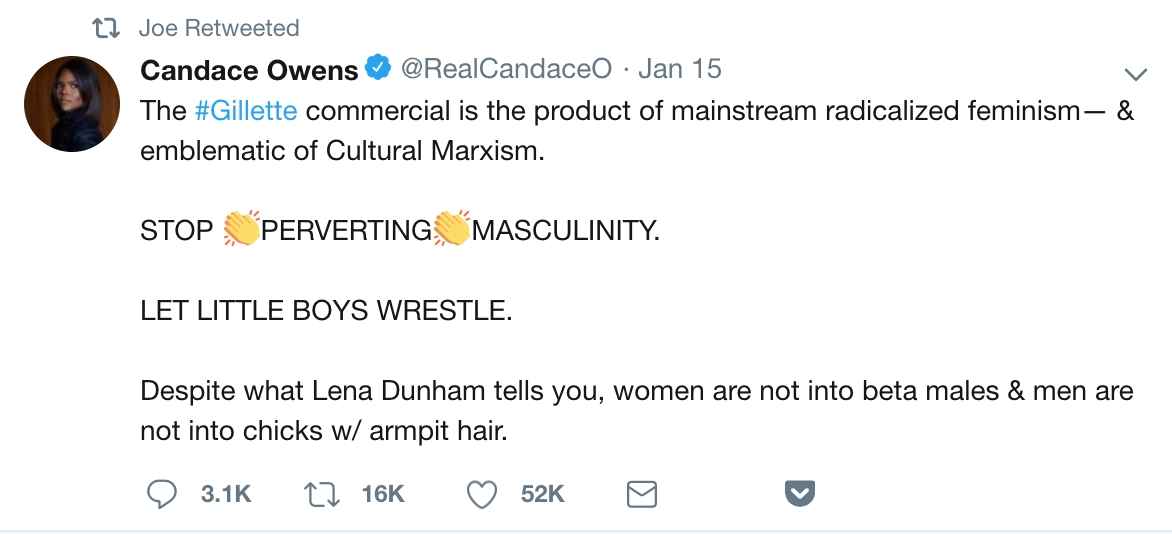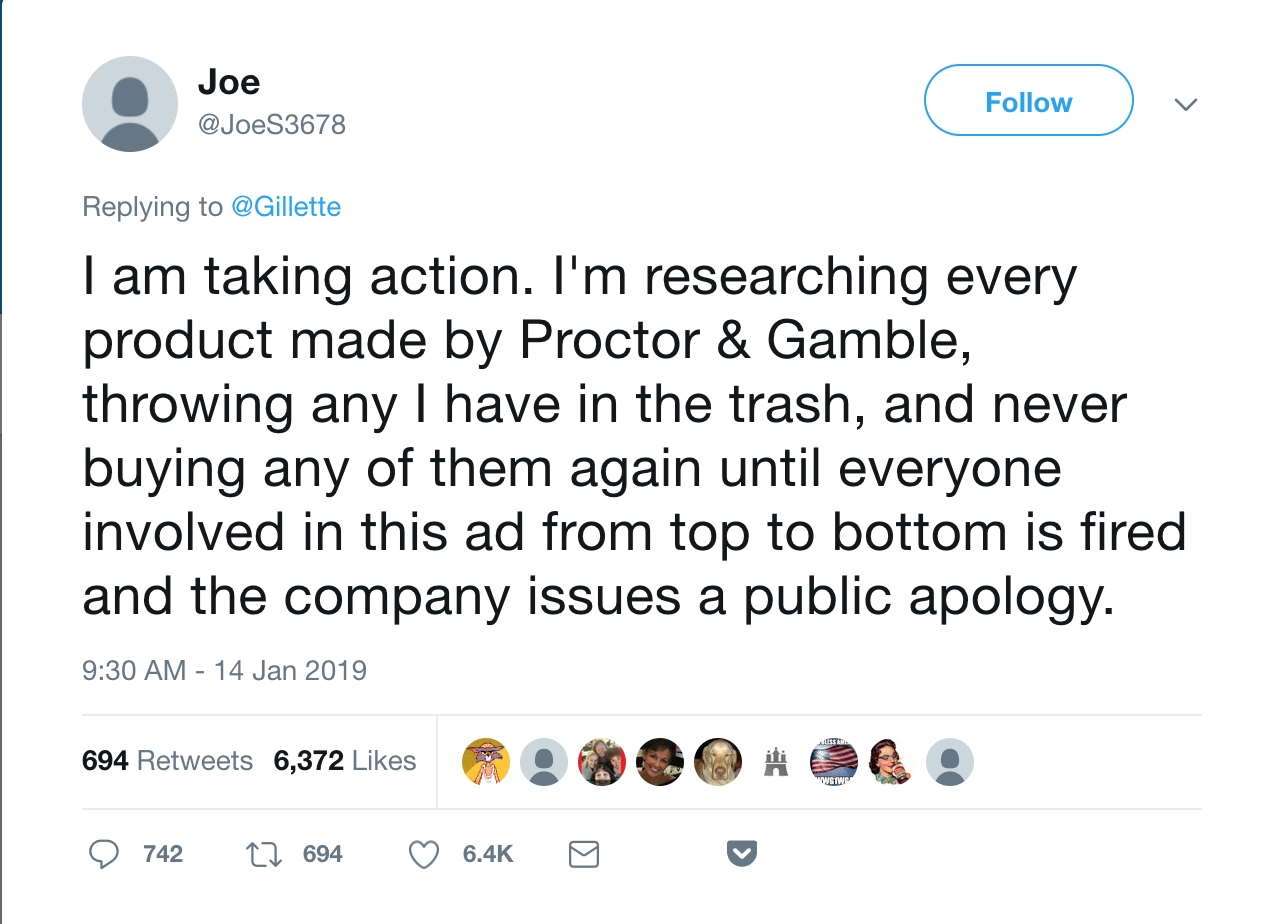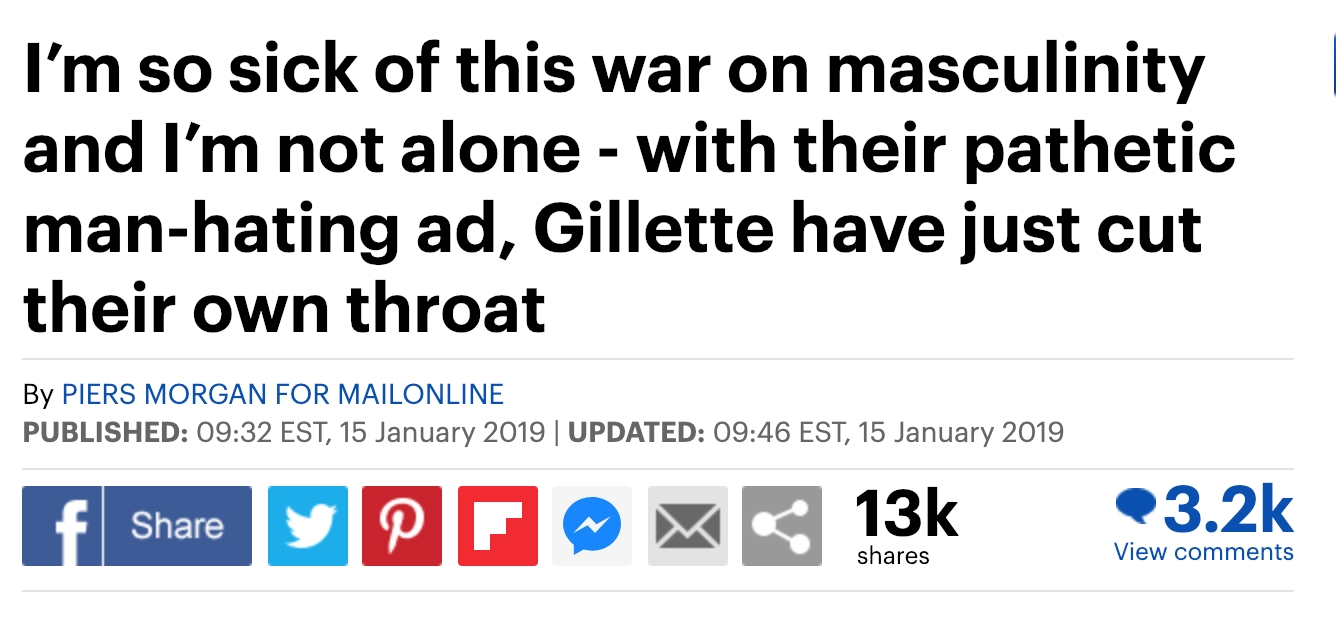
This week, an advertisement once again dominated the national conversation. In theory, it was about toxic masculinity, rape culture, and workplace gender dynamics but it had been focus-grouped so many times that the final product was just a collection of commonplace pleas to men:
- Maybe let’s not have kids murder one another without saying anything.
- How about you don’t grope that lady at work, okay?
- Also, please stop yourself from chasing women down the street with your eyes bulging like a maniac.
That’s it. And that simple video, which can be summed up as “Bros, let’s show a modicum of human decency,” sparked absolute outrage from some anonymous Twitter accounts and the rogue’s gallery of right-wing pundits who make very good money blowing such things wildly out of proportion.
According to Candace Owens, head of Turning Point U.S.A, a single viewing of it magically turned us all into beta libtard cucks. She even accused it of “perverting masculinity.”

To which the only reasonable and measured response is… Da fuk?
Chill, Candance. Boys can still wrestle. They just shouldn’t shatter one another’s faces without someone intervening. Is that super beta male to say? “Hey kids, don’t gouge each other’s eyes out with a barbecue fork!” If so, can we have Piers Morgan or some other paragon of masculinity explain that to Terry Crews in a public setting, maybe with paramedics handy?
Obviously, the backlash to the ad comes from an intentional misreading (or “mind poisoning”) of something that’s based 100% in common sense. It’s bad faith outrage, trickling down from the InCel movement to the semi-mainstream. Candance Owens or Rush Limbaugh or anyone else who railed against this innocuous bit of corporate pandering would never say on air that eight boys chasing one boy like extras in Lord of the Flies is normal. That’s absurd and they know it.
Yet the ad quickly became a lightning rod for Limbaugh, Owens, Tomi Lahren, and others to call out what they see as a systemic attack on the male gender. Which is a hell of a takeaway to draw from all the clean shaven dudes staring thoughtfully into mirrors and the lineup of dad bods who don’t know how to use a grill. (Note to Zombie Dads: Your burgers look greyer than the sexuality and gender spectrums that right-wing pundits wish didn’t exist!)
Even Jordan Peterson — a professor who, until recently, seemed eager to interrogate ideas about gender in a deliberate, thoughtful way — got in on the action by hinting at a boycott. Does Peterson realize how many brands P&G owns? They literally make everything. Is the prof really ready to wipe with pine needles? Because, like many of the people irked by this, he doesn’t seem particularly rugged.
It wasn’t long before someone on Twitter took this bit of thought leadership to the furthest possible realms of nonsensery and vowed to boycott all Procter & Gamble brands. The tweet was shared by Rush Limbaugh and others on the right, though it seemed to come from a Twitter ghost with a handful of followers. Pro tip: You always know that someone is sure to follow through on his comprehensive boycott pledge when he hasn’t taken the time to find a profile picture.

The only reason for unpacking all of this ridiculousness is that it buckets into the deeply flawed nature of the culture wars, in which the template is:
- GET ANGRY ABOUT SOMETHING THAT NOBODY SAID: In this case, that all men are bad and all masculinity is inherently evil.
- DISCUSS IT IN TERMS AND IN A TENOR THAT IT BY NO MEANS DESERVES: Because it is still, at its heart, an advertisement for a razor and not an amendment to the constitution.
- USE IT TO RALLY YOUR FOLLOWERS AROUND IDEAS THAT THE ORIGINAL ITEM IN QUESTION DOESN’T ACTUALLY SUPPORT: That the world would be better if men stopped being men (as if the very idea of manliness were monolithic, which it’s clearly not).
That’s the fear monger’s mantra. The entire process is cowardly and corrosive. Worse yet, it leaves the landscape so littered with false flags that we can’t see the real issues to even discuss them. We’re so busy unpacking the virtues or failures of an ad which essentially says to men, “Let’s try to be cretins less often,” that we miss the chance for substantive debate and good faith discussions.
https://www.youtube.com/watch?time_continue=67&v=koPmuEyP3a0
The thing is, there are important conversations to have about masculinity, femininity, and our evolving ideas of gender in America. Real discussion is needed to help men be better allies to the #MeToo movement, while still recognizing that there’s going to be a learning curve. There’s also room for debate over what traditionalists and feminists believe about female autonomy in our changing world. For example, is the young woman in the ad, dancing on an MTV’s Beachhouse-type show, being exploited or does she have every right to explore and fully inhabit her sexuality? Once she decides to dance half-naked, should the cameras refuse to show it or is it more enlightened to honor her right to free expression? Should teenage boys not watch, because that’s what it means to be a true supporter of women? Or is the idea that the final onus of what to do with these images lands on three teenagers crashed on their mom’s couch a little far fetched?
Considering that the rest of the ad is full of no-brainers (don’t let boys kill other boys), this single moment from the two-minute piece might have sparked some fascinating conversations. Experts could add real nuance in a way that drove dialogue and understanding forward. But instead of a thoughtful approach from people are who are too brave to intentionally misread an advertisement, we get chaos. Men casting themselves as victims and declaring that masculinity is on the chopping block.

Congratulations to anyone who had Piers Morgan in the “who will declare there’s a war on X-thing that there’s clearly not a war on” sweepstakes. Oh, the irony of a man who is almost constantly hysterical taking time out to write a screed about how values like stoicism are being lost.
And all this because of razors, both the ones Gillette makes and Occam’s, a principle which states that the simplest answer is often the best. In this case, the simplest answer is that the real intent of the ad was a corporation’s desire to sell a grooming product, not just today but over the course of the next decade and beyond. To do so, Gilette thirstily horned in on the 100 mile-per-hour cultural conversation. Their model was Nike’s famous Kaepernick ad. And, like Nike’s ad, the fact that Gilette thought that opening a conversation about positive values was a smart strategy is generally a good sign. When a corporation whose single biggest shareholder is a hedge fund set on making the mega-rich even mega richer draws a line in the sand, you know they’ve crunched the numbers and they’re making the call for the sake of their own long-term success.
It may be a calculated business decision, but it’s better than if that calculated business decision was “Let’s go back to the Mad Men era.” Not because masculinity and being a Don Draper-style Alpha-male is inherently perverse — as right-wing pundits like to pretend that the left believes — but simply because harassing and demeaning others is a shitty thing to do. We don’t even have to debate whether it’s shitty because most of society, men included, thinks it’s a problem and we have plenty of metrics for measuring its negative effect on the workplace.
So maybe… we could talk about it, instead of flushing razors down the toilet?

At the end of the day, the fact is: Any man whose sense of self and gender identity is challenged by a commercial that patiently asks men to be better in the vaguest possible terms is a man whose sense of self and gender identity is made out of popsicle sticks and Saltine crackers.
Any man who can’t look at an ad and calmly say, “This ad isn’t attacking me, because I don’t mansplain women at work while pawing at them or let my son pummel some other kid while cooking the world’s saddest looking burger” has no genuine confidence in his ability to fit his own vision of “manliness” (note that Piers Morgan is always the offended British male in these cases; never some badass like Bear Grylls).
And any man who is so cowardly as to manufacture outrage over a commercial that does little more than tell men to be our best selves and respect others probably isn’t equipped with the intellectual firepower to discuss gender and sexuality in our modern world with the rigor that the topic deserves.
So once again, it seems that we’ll have to settle for a stalled out conversation, centered around people whose thinking is so rigid and egos are so frail that even a cheesy ad on the subject of men trying to not be monsters causes them to spin out of control. It’s a shame because the topic is important and deserves our attention, but it’s getting obscured by fake fury.
Unless we decide, collectively, that just because the debate has cycled through a round of disingenuous histrionics doesn’t mean that it has to be over. Perhaps people who want to discuss gender and the very notion of toxic masculinity in good faith can use this as a jumping off point. We can have long-needed conversations, rather than wail about how an ad that told us not to be awful is somehow worthy of our clickbait vitriol.
In short, we can try to be our best. Not because a brand told us so, but because it’s the right thing to do.
